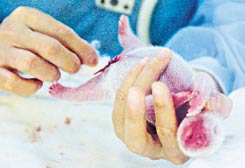According to reports from China, the panda cloning project has entered its final phase * Will the next surrogate probably be a bear

One day old panda cub. Many scientists in China criticize the cloning attempts
Direct link to this page: https://www.hayadan.org.il/pandaclown.html
China managed to overcome two fundamental difficulties, which prevented the possibility of cloning the giant panda, and it is now facing the last scientific obstacle on its way to realizing the initiative. So, according to a Chinese scientist, the head of the Chinese panda cloning project, Chen Deyuan, said last Sunday. Chen made the remarks at a conference to mark the XNUMXth anniversary of the founding of a panda research institute in the southeastern Chinese city of Fuzhou.
However, other Chinese scientists argued that it is doubtful whether the project, which is centered in the laboratory of the Chinese Academy of Sciences in Beijing, is at such an advanced stage. According to them, it seems that the findings on which Chen was based will not be able to be reproduced in further experiments. The entire project has been criticized by Chinese scientists, who argue that it is too expensive and that the best way to protect the 1,000 pandas left in the wild is to better preserve the mountainous forests of southwest China.
According to the scientist present at the conference, Chen said that the last obstacle holding back the cloning project is the difficulty of keeping the fetus alive inside the womb of the surrogate mother until the stage when it can be removed. Chen claimed that the team of researchers of the project managed to overcome two other obstacles - they managed to create a panda embryo from an egg of another animal, and they managed to implant the embryo in the womb of a surrogate mother who is also of a different species.
The researchers used a rabbit egg, because only one in five pandas can produce a sufficiently developed egg (low fertility is one of the reasons for the pandas' low reproduction rate). They succeeded in creating an embryo using this method in 1998, and according to Chen, a year ago they even succeeded in implanting it in the uterus of a cat. The cat died two months later, and the researchers have so far been unable to reproduce the experiment. Chen said that in the next phase of the experiments, the researchers will use a surrogate mother from a species closer to the panda - for example, a bear. He did not say when he thinks it will be possible to crown this stage with success.
Wang Dejun, a panda researcher at Peking University, said he has yet to see evidence to suggest that researchers have found a method to create a panda embryo from rabbit eggs. According to him, the researchers are unable to explain how the 1998 experiment was successful and they cannot repeat it. But even if they succeed, he added, cloning mammals has not yet produced healthy adult animals, and therefore "there is no value in cloning pandas."
https://www.hayadan.org.il/BuildaGate4/general2/data_card.php?Cat=~~~388597052~~~29&SiteName=hayadan
